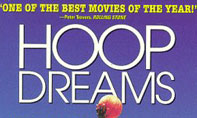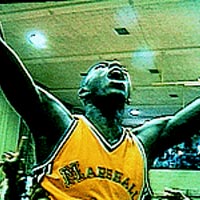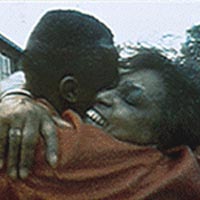- About Us
- Columns
- Letters
- Cartoons
- The Udder Limits
- Archives
- Ezy Reading Archive
- 2024 Cud Archives
- 2023 Cud Archives
- 2022 Cud Archives
- 2021 Cud Archives
- 2020 Cud Archives
- 2015-2019
- 2010-2014
- 2004-2009
 |
The Best Movies You've Never Seen |
Directed By Steve James. Running Time: 165 Minutes
People always say to me, ...when you get to the NBA, don't forget about me.... Well, I should've said back, ...if I don't make it to the NBA, don't you forget about me....
William Gates
Ostensibly, Steve James' brilliant Hoop Dreams follows six years in the life of two young African'American basketballers, William Gates and Arthur Agee, discovered on the playgrounds of tough, inner'city Chicago, and pursuing their dreams through high school and into college of one day playing in the National Basketball Association. But at its core, this film is not really about basketball, nor is it a self'indulgent, seemingly endless documentary (though long it is). Instead, it is about the daily struggles of race and inequality among the American under'class, about the intense pressures of expectation, and the perseverance of hope.
 James' cameras peer into the daily lives of Gates and Agee at school, on the court, and at home. In over half a decade of filming with some 250 hours of footage, he was witness to some of the most dramatic and important events in these young men's lives. As viewers we are given a unique insight into real life in an embattled African'American neighbourhood that extends well beyond the often limited, negative or sensationalised images regularly seen in the mainstream media. American reviewer Robert Ebert noted, 'Hoop Dreams contains more actual information about life as it is lived in poor black city neighbourhoods than any other film I have ever seen.'
James' cameras peer into the daily lives of Gates and Agee at school, on the court, and at home. In over half a decade of filming with some 250 hours of footage, he was witness to some of the most dramatic and important events in these young men's lives. As viewers we are given a unique insight into real life in an embattled African'American neighbourhood that extends well beyond the often limited, negative or sensationalised images regularly seen in the mainstream media. American reviewer Robert Ebert noted, 'Hoop Dreams contains more actual information about life as it is lived in poor black city neighbourhoods than any other film I have ever seen.'
One week a family of six live in darkness without power because they can't afford to pay the energy bill. Another week, a teenager earning less than $3.35 an hour is robbed at gunpoint on his way home. Both students at the heart of this film struggle to perform well academically. On an athletic scholarship to an elite (and largely all'white) private school, William's coaches and school administrators  seem at times more than willing to let his studies slide so long as he plays well on the court. In Arthur's case, attending the severely under'funded Marshall Metropolitan High School, he is hardly getting the attention or discipline needed for him to succeed academically. We watch as Arthur's mother fights to keep her family safe, fed and in full spirits while she copes with a drug addicted husband, the harsh limits of welfare support, and attempts, against the odds, to create a career of her own as a nurse's assistant. In William, we find a teengaer raised in a single parent home and whose father only reappears when it seems his son may hit the big time. He is forced to live out his elder brother's own failed dreams, and has an entire neighbourhood of expectation hoping that he might be the one ticket that gets them all out of the ghetto. Under this kind of pressure there is no room for injuries, no time to take a break and, increasingly, no joy left in playing the game.
seem at times more than willing to let his studies slide so long as he plays well on the court. In Arthur's case, attending the severely under'funded Marshall Metropolitan High School, he is hardly getting the attention or discipline needed for him to succeed academically. We watch as Arthur's mother fights to keep her family safe, fed and in full spirits while she copes with a drug addicted husband, the harsh limits of welfare support, and attempts, against the odds, to create a career of her own as a nurse's assistant. In William, we find a teengaer raised in a single parent home and whose father only reappears when it seems his son may hit the big time. He is forced to live out his elder brother's own failed dreams, and has an entire neighbourhood of expectation hoping that he might be the one ticket that gets them all out of the ghetto. Under this kind of pressure there is no room for injuries, no time to take a break and, increasingly, no joy left in playing the game.
 In 1994 Hoop Dreams won the audience award for best documentary at the Sundance Film Festival and controversy surrounding the film's exclusion from the Best Documentary category at the Academy Awards was such that it changed the way nominations were voted for that category in the future. It was discovered that not only were most of the people voting at the time not documentary filmmakers, but they had also actually worked against giving Hoop Dreams a nomination. As a result, the rules were changed so that documentary filmmakers today now vote in this category.
In 1994 Hoop Dreams won the audience award for best documentary at the Sundance Film Festival and controversy surrounding the film's exclusion from the Best Documentary category at the Academy Awards was such that it changed the way nominations were voted for that category in the future. It was discovered that not only were most of the people voting at the time not documentary filmmakers, but they had also actually worked against giving Hoop Dreams a nomination. As a result, the rules were changed so that documentary filmmakers today now vote in this category.
For those among you whose documentary viewing began and ended with Michael Moore's recent efforts or Super Size Me, Hoop Dreams will be a welcome, rewarding discovery in your nearest video store.
